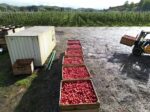Lotus Land Agency updates from The World’s 50 Best Restaurants 2025
The annual global ceremony to celebrate The World’s 50 Best Restaurants was held in Turin, Italy, yesterday evening, the 19th June. Lotus clients: Ikoyi – Jeremy Chan; KOL – Santiago Lastra; Saint Peter – Josh Niland; Koan – Kristian Baumann; and Burnt Ends – Dave Pynt, all received their latest positions within the top 50 and the extended list. No. 15 and the Highest Climber Award – Ikoyi, London. Eight years later, Ikoyi, led by co-founders Chef Jeremy Chan and Managing Director Iré Hassan-Odukale, continues to evolve through curated seasonal menus. Their dishes feature the finest hyper-seasonal British produce combined with globally sourced ingredients, creating a balance of elegance and bold flavors. New dishes such as green pea hummus with Kaluga caviar, green beans seasoned with elderflower and finished with pork consommé, exemplify Ikoyi’s global modernism, representing a placeless, free, unfixed, and personal style while reflecting the energy of its international city home No. 49 – KOL, London. Chef Santiago Lastra and his one-Michelin-Star, KOL, are already celebrating five years of bringing a taste of Mexico to the fine dining world in London. This August, Santiago and KOL return to Mexico for a one-night collaboration with two-Michelin-starred Quintonil and Chef Jorge Vallejo. Together, Santiago and Jorge will explore their heritage and conceptualise a new wave of Mexican cuisine. Santiago is honoured and grateful to represent Mexico on the global gastronomic stage, believing ‘the simplest ingredients can be made extraordinary if you believe in them’. No. 66 – Saint Peter, Sydney. Saint Peter, Josh and Julie Niland’s Sydney restaurant, rose an enormous 32 places to No. 66 on The World’s 50 Best Restaurants Awards list. This year, the restaurant relocated from its original site as Josh and Julie opened their first hotel—The Grand National—just around the corner from the original Saint […]










